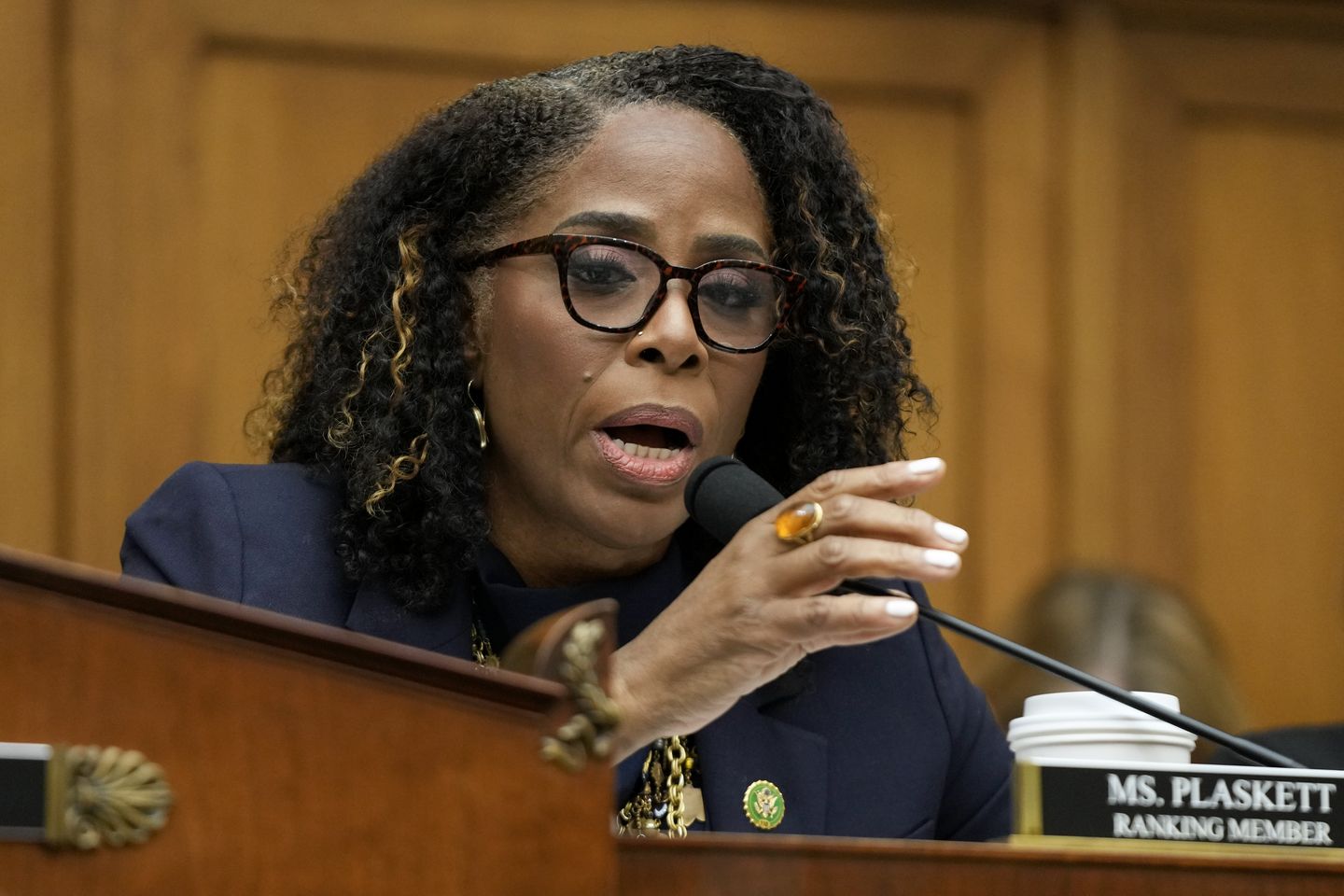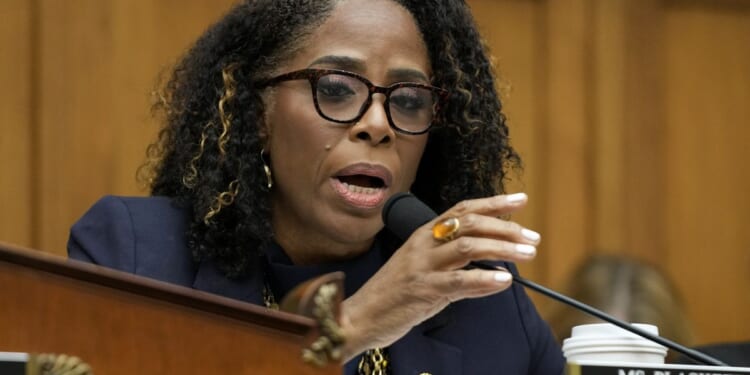
The House voted Tuesday night to reject a GOP-led effort to censure Del. Stacey Plaskett for “inappropriate coordination with convicted sex offender Jeffrey Epstein during a congressional hearing” in 2019.
The 209-214 vote failed as three Republicans joined all Democrats in opposition and another three Republicans voted “present.”
The censure resolution also would have removed Ms. Plaskett, the Democratic delegate for the U.S. Virgin Islands, from the House Intelligence committee.
The measure also would have directed the Ethics committee to conduct a full investigation into the extent of Ms. Plaskett’s ties to Epstein and “any potential further improprieties.”
The ethics panel’s investigation could still happen without a vote.
If the House had voted to censure Ms. Plaskett, Democrats planned to force a vote on censuring Rep. Cory Mills, Florida Republican.
That censure would have included allegations that he assaulted and harassed romantic partners, violated campaign finance and financial disclosure laws, and misrepresented events of his service in Iraq for which he was bestowed a Bronze Star.
The effort to censure Ms. Plaskett was led by Rep. Ralph Norman, South Carolina Republican, and other members of the House Freedom Caucus.
Rep. Andy Harris, Maryland Republican and Freedom Caucus chairman, accused Ms. Plaskett of “colluding with a convicted felon during a congressional hearing” based on text messages she and Epstein exchanged in 2019.
Epstein was a wealthy financier and a constituent of Ms. Plaskett’s. He owned a small private island within the Virgin Islands, where many of his sex crimes took place.
While he had not been charged at the federal level at the time of the 2019 hearing and texts with Ms. Plaskett, Epstein was a convicted sex offender.
He pleaded guilty in 2008 to solicitation of prostitution from a minor.
The texts between Ms. Plaskett and Epstein were released last week as part of a trove of documents from Epstein’s estate that the House Oversight and Government Reform Committee subpoenaed.
The messages were exchanged before and during a February 2019 Oversight committee hearing Ms. Plaskett attended.
Michael Cohen, President Trump’s former personal attorney and fixer, was testifying about his accusations that Mr. Trump manipulated financial records and directed hush money payments to cover up an extramarital affair.
The messages suggest Ms. Plaskett leaned on Epstein’s advice as she developed the questions she planned to ask Mr. Cohen.
Ms. Plaskett’s name was redacted in the Oversight documents, but she did not deny texting with Epstein during the 2019 hearing.
She said it was not public knowledge at the time that he was under federal investigation for sex trafficking and that he was one of many constituents who reached out to hear after she had a viral moment early in the hearing.
“We all know that Jeffrey Epstein’s actions were absolutely reprehensible,” Ms. Plaskett said. “As a constituent, as an individual who gave donations to me when I learned of the extent of his actions after his investigation, I gave that money to women’s organizations in my community.”
Epstein was indicted on federal sex trafficking charges months after the hearing and died in jail before he could stand trial. His death was ruled a suicide.
Ms. Plaskett said she was not involved in any of Epstein’s crimes and that victims who had initially filed a lawsuit against her dismissed it on their own without prejudice.
Republicans argued that Ms. Plaskett should not have been taking advice from a convicted sex offender.
“This was not just casual contact,” Mr. Norman said of the texts she exchanged with Epstein. “They were deliberate communications, and they shaped her official line of questioning at a congressional hearing.”
In the texts, Epstein told Ms. Plaskett that Mr. Cohen “opened the door to questions re who are the other henchmen at trump org,” including former Trump executive assistant Rhona Graff, whom he described in one message as “RONA – keeper of the secrets.”
“RONA??” Plaskett responded. “Quick I’m up next is that an acronym.”
Ms. Plaskett then asked Mr. Cohen whether the committee should be meeting with other Trump associates and specifically questioned him about a “Ms. Rhona.”
Mr. Cohen said Ms. Graff is Mr. Trump’s executive assistant “and she’s involved in a lot that went on.”
Ms. Plaskett said she got that one name from Epstein, but that was a small part of her five minutes of questioning at the hearing, for which she had prepared in advance.
“I don’t need to get advice,” she said. “I have been a lawyer for 30 years. I have been a narcotics prosecutor in New York City. I have had the honor of being a political appointee at the Justice Department after Sept. 11, as a Republican appointee in the Bush administration. I know how to question individuals.”
Ms. Plaskett also accused Republicans of being hypocrites for condemning her for texting with a convicted felon.
“You want to talk about texting felons? How often do you text President Donald J. Trump?” she said.
House Democratic leaders initially dodged questions about Ms. Plaskett’s communication with Epstein by pointing to the larger effort by Congress to force the Justice Department to release its case files on Epstein.
But they defended her on the House floor.
“She’s a woman of great intelligence and a woman of great integrity, and she deserves better than what she’s receiving from House Republican extremists,” said House Minority Leader Hakeem Jeffries, New York Democrat. “She deserves the opportunity to be heard. She deserves due process.”
Mr. Jeffries called the censure effort from Mr. Norman “a political stunt by a desperate, failed candidate for governor trying to pander to the people back in South Carolina.”
Democratic leaders tried to refer the censure resolution to the Ethics committee, but the motion was defeated.
Republicans want the Ethics committee to investigate the extent of Ms. Plaskett’s ties to Epstein but said it’s appropriate to remove her from the Intelligence panel in the meantime.
Rep. Clay Higgins, Louisiana Republican, argued Ms. Plaskett “has crossed the threshold of reasonable suspicion.”
“A text exchange is rather intimate in the realm of communication,” he said. “And to pierce into an actual congressional hearing, for a member of Congress to receive and respond to a text message during a hearing, that is quite familiar, is it not?”











